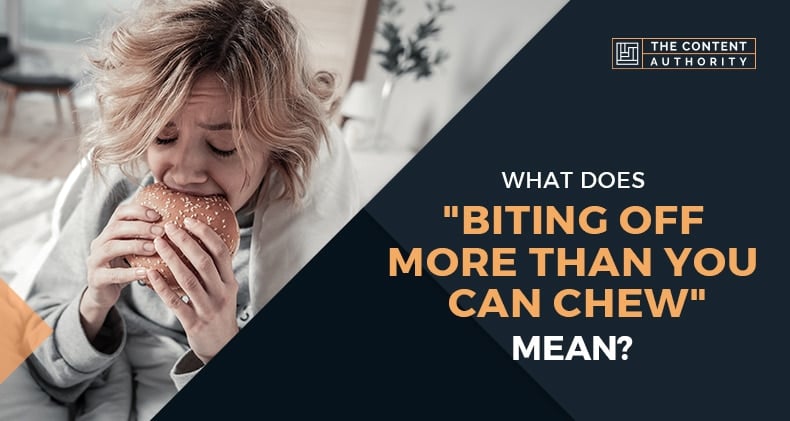In order to help you understand the meaning behind this idiom, think about a time (or imagine) when you took a huge bite out of something, let’s say a burger. And then, there was too much food in your mouth, to the point that you couldn’t chew it.
This expression means to do something that is too difficult for you, it means that a person has taken on too much, more than they could/should have. That is where this idiom originates from. It’s when you try to do much more than what your possibilities or situation allow.
But where did it come from? For how long have we been using it?

Meaning of “Biting Off More Than You Can Chew”
Let us consider the definition of the term «idiom». According to Oxford dictionary, an idiom refers to a group of words established by usage as having a meaning not deducible from those of the individual words. To put it another way, an idiom is an expression, whose meaning cannot be concluded from the literal definitions, but refers to a metaphorical meaning that is only known through common use. Many times, idioms are used in all types of languages, formal and colloquial, written and spoken; they are also a part of business English, education and the media.
For the idiom “Biting Off More Than You Can Chew”, the easier way to understand the meaning is to imagine a metaphor that represents someone taking a larger bite of a food item than that which they can effectively chew and swallow.
Here are some additional definitions and/or explanations to better understand its meaning:
- To attempt to handle more than one is able to do
- To commit to promising something one cannot fulfill
- To try to do something which is hardly achievable
- To start or promise to do something that is more than one can accomplish
Origin Of “Biting Off More Than You Can Chew”, Who Used This Famous Saying First?
It is imperative to consider the origin of the most widely used idioms. There is a vast variety of idioms which come from the vocabulary regarding different topics.
The origin of “Biting Off More Than You Can Chew” is unknown, but according to fables, it is supposed to have originated in America. Some say that the oldest written records of this phrase can be traced from the 1870s, while others say it was used during the late 19th century when a man offered another man a bite of his plug of chewing tobacco.
Examples Of How People Use The Idiom
Some sentences on how the phrase can be used might help ease the understanding of this interesting idiomatic expression. Here are a few:
By accepting three part-time jobs, she is clearly biting off more than she can chew.
It feels like I bit off more than I could chew when I promised to have this worksheet ready in one day.
I would like to suggest we don’t bite off more than we can chew by accepting this job in Alaska during winters.
The anaconda bit off more than it could chew. It just killed a big cattle but then couldn’t swallow it.
I am sure, he is biting off more than he can chew by promising them to solve the tough puzzle in just a few minutes that they couldn’t for the last four days.

“Biting Off More Than You Can Chew” In Different Tenses
When Used In The Present
The present tense is the grammatical tense whose main role is to locate a situation or event in the present time. We used the present tense for actions that are happening now. For example, I bite off more than I can chew.
When Used In The Past
We talked in the past when we wish to express a state that previously existed or an action that has happened. For example, I bit off more than I could chew.
When Used In The Present Perfect
It is used to describe a situation or an action that started in the past and continues in the present. For example, I’ve bitten off more than I can chew.
When Used In With “Going To” For On The Future Tense
Normally, we use the BE GOING TO structure to indicate the future. For example, I’m going to bite off more than I can chew.
Similar Phrases to “Biting Off More Than You Can Chew”
Other proverbs, idioms, phrases, and words have been closely related to the use of this particular phrase. Here are some of the most similar terms and phrases — some apply, some have a deeper meaning:
- cut off more than one can chew
- have eyes bigger than one’s belly
- have eyes bigger than one’s stomach
- try to do too much
- be careless
- be overconfident
- be presumptuous
- be reckless
- bite off more than you can chew
- overleap oneself
- overrate one’s strength
- punch above one’s weight
- bite more than one can chew
- overplay one’s hand
- overstep the mark
- risk one’s fortune
- take on more than one can handle
- take on more than one is capable of
- take too much responsibility
- try to do more than one is able to do
- undertake too much
- venture too far
- want more than one can handle
- be cocky
- advance too far
- carry things too far
- go to extremes
- go too far
- miscalculate
- overreach
“Biting Off More Than You Can Chew” Uses In Arts And Entertainment
The use of this phrase does not limit itself to the regular day-to-day conversations we have with family or friends, this is also very used in different entertainment spheres, such as songs, movies, books, and many more. Let’s see some examples of how it is used by artists.

Biting Off More Than You Can Chew: The Phrase Used In Songs
Angela Bofill in her son “Too Tough” uses it like this:
People say he’ll make me
Bite off more than I can chew
But ain’t nobody’s business
If I do
In the song “Gate 22”, Pascale Picard sings:
There are too many dreams I must chase down
Though sometimes I bite off more than I can chew
I know you’d like to keep me near
I know it’s easier to be two
Just like the song “I’m Useless” from The Queers
I’m always doing things that I don’t wanna do
I seem to bite off more than I can chew
I used to have a job, but now I’m through
Biting Off More Than You Can Chew: The Phrase Used In Movies
Movies have also taken advantage of idiomatic phrases, in order to help them reach many viewers. Here are some examples:
In 2014, producer Shonda Parker wrote and directed a movie called “Biting Off More Than You Can Chew”. This was a short comedy about three different groups of survivors who during the first hours of the Zombie Apocalypse, take shelter in the same house. We are not really sure how that relates to the name of the movie, so I guess you would have to watch it to find out.
Biting Off More Than You Can Chew: The Phrase Used In Books
Books authors have often used proverbs to express their emotions and connect with their audience, and this phrase is not the exception.
The warning “don’t bite off more than you can chew” would remind whoever receives the warning not to be greedy. This is the meaning applied in the book named ‘Western Wilds, and the Men Who Redeem Them’ written by John Hanson Beadle which was originally published in 1877.
“Our folks was all agin the war from the start. I was down as Manchester the day they hauled down the stars an’ stripes, an’ sez I, ‘Men, you’ve bit off more’n you can chaw,’ an’ they laughed at me. But I knowed them Northern men—seed ’em in Californy. Slow, mighty slow, to start a fight, but awful to hold on.”
Biting Off More Than You Can Chew: The Phrase Used In Quotes
People look to all kinds of places trying to find the inspiration to write, especially quotes. The phrase “Bite off more than you can chew”, has been used many times by authors who want to convey their message and leave a mark. Let’s see a few:
“Don’t bite off more than you can chew because nobody looks attractive spitting it back out.”
― Carroll Bryant
“Bite off more than you can, then keep chewing.”
― Joe de Sena
Cool Fact! Did you know?
The Italian equivalent of “Don’t bite off more than you can chew” is “Non fare il passo piu lungo della gamba,” which means, “Don’t take a step longer than your leg” (Idioms Online).
More English Idioms
Summary
Idiomatic expressions — also referred to as idioms — are a type of colloquial or informal language in which the meaning is different from the meaning of the actual words in the expression.
Idiomatic expressions such as this one can help improve your conversational abilities because it demonstrates native speakers your understanding of the cultural meaning and context behind the idiom you’re using. This can help in feeling more comfortable and confident with your conversation skills.
The use of idiomatic phrases (idioms) has a significant influence on those teaching and/or learning a foreign language — even those in their native language —, because it could be one of the ways to provide students better conditions to improve their communicative skills in the daily context.
When learning new phrases or idioms, just remember not to bite more than you can chew.
Shawn Manaher is the founder and CEO of The Content Authority. He’s one part content manager, one part writing ninja organizer, and two parts leader of top content creators. You don’t even want to know what he calls pancakes.

